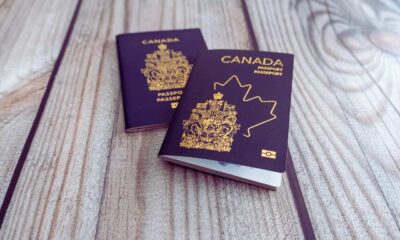Immigration Announcement
H-1B Restrictions in U.S Drive Skilled Workers to Canada

Recent studies from the Bank of Canada shed light on a significant immigration trend, revealing the aftermath of H-1B visa restrictions imposed during the Trump administration. The findings indicate that the constraints, intended to protect American jobs, inadvertently steered a wave of 76,000 college-educated immigrants toward Canada in 2018 and 2019. This migration surge, accounting for 3.5% of Canada’s stock of college-educated immigrants, is a testament to the intricate global effects of immigration policies.
The Ripple Effect of Third-Country Impacts
In the report titled “Third-Country Effects of U.S. Immigration Policy,” researchers Agostina Brinatti and Xing Guo outline the repercussions of U.S. policy shifts. While the restrictive H-1B visa rules aimed to safeguard certain American jobs, the study indicates that they resulted in an increased influx of skilled immigrants to Canada. This shift, particularly in high-skilled service sectors, impacted production and labor markets.
Unintended Consequences on the U.S. Labor Market
The study highlights a nuanced outcome of the U.S. restrictions. While a subset of American workers benefited by facing less direct competition from immigrants in their job market, others faced challenges due to sector contractions. The findings suggest that these restrictions not only failed to fully protect jobs but also triggered an unexpected decline in wages for American workers. The intricate dance between immigration policies, international trade, and the global labor market becomes evident in these outcomes.
Canada’s Gains Rise in Skilled Immigration and Economic Growth
Canada emerged as a key beneficiary of the H-1B visa restrictions, particularly witnessing an upswing in the number of computer scientists immigrating to the country. High-skilled service sectors, including information and culture, business and professional services, and finance and insurance, experienced a notable boost in their labor force. The injection of immigrant labor contributed to a 0.8% aggregate expansion of production.
Start-Up Visa Program for Foreign Investors
Beyond skilled workers, the study unveils another facet of Canada’s appeal—the Start-Up Visa (SUV) program. Tightened immigration policies in the U.S. prompted foreign investors to explore opportunities in Canada. The SUV program, designed for private-sector investors, saw increased participation. This initiative allows investors to gain permanent residence through their investments, fostering economic growth and innovation in Canada.
SUV Eligibility and Process
Under the SUV program, angel investors, venture capital funds, and business incubators play a pivotal role. Venture capital funds and angel investor groups must make substantial investments, while business incubators accept applicants into their programs. The SUV route offers foreign investors a pathway to permanent residency, aligning with Canada’s commitment to attracting innovative minds and businesses.
Looking Ahead in 2024
As immigration policies continue to influence global mobility patterns, Canada stands at the forefront, offering a welcoming environment for skilled workers and visionary investors. The unintended consequences of H-1B restrictions in the U.S. serve as a testament to the intricate interplay between immigration policies, economic landscapes, and the quest for talent on a global scale.
The Bank of Canada’s study illuminates the intricate dynamics of immigration, showcasing how policy shifts in one country can reverberate globally. Canada’s ability to attract skilled immigrants and foreign investors underscores its resilience and appeal in an ever-evolving landscape. As we navigate the complexities of immigration, Canada emerges not just as a destination but as a strategic player in the global talent and investment arena.
























